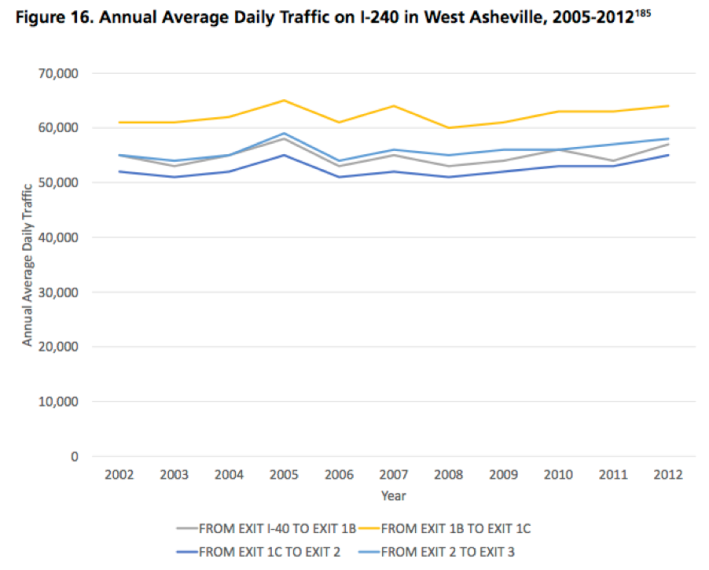
Tomorrow, U.S. PIRG and the Frontier Group will release a report titled, “Highway Boondoggles: Wasted Money and America’s Transportation Future.” In it, they examine 11 of the most wasteful, least needed road projects underway in America right now.
Yesterday we published our first preview of the report, the story of the bizarre wishful thinking behind the proposed Effingham Parkway in Savannah, Georgia. Here we continue with a look at North Carolina's bright idea to expand a road through a thriving city for no reason.
North Carolina officials have proposed expanding I-240, which runs through downtown Asheville and connects I-26 southwest of Asheville to other highway routes northwest of the city. Local residents, however, have questioned whether the project as currently designed would damage a mature, livable neighborhood to build road space that is not actually needed.
The I-26 project is a complex mix of reconstruction, rerouting and expansion of Asheville’s highway network. The $400 million to $600 million project is divided into three major subsections -- each of which has been the subject of intense debate -- including the proposed widening of 4.3 miles of four-lane highway through West Asheville to eight lanes, plus an additional auxiliary lane on each side and widened shoulders.
State officials cite federal requirements to justify this massive expansion. Yet traffic data as old as 2004 suggest that six lanes could be more than enough to address the perceived need. And since that study, traffic has not increased significantly along that stretch of road. In fact, from 2005 to 2012, traffic has dropped on three of the four segments — and stayed flat on the fourth. (See chart above.)
The cost of going to eight, rather than six, lanes appears to be unjustified by the reduction in congestion that would result. The time saved by adding the two extra lanes would be just 9.6 seconds per driver (out of a 6.5-minute travel time) during the morning rush hour and 17.4 seconds during the evening.
In light of the lack of justification for expanding this segment, and controversies over other areas of the proposal, the whole project’s review process is being redone, with a new Draft Environmental Impact Statement expected to be issued in the summer of 2015. It will include a new traffic analysis. That undertaking is an important step to ensure that decisions about the future shape of the highway are made with full, updated information that reflects recent changes in transportation trends.
Phineas Baxandall, senior policy analyst at U.S. PIRG, and Jeff Inglis, policy analyst at the Frontier Group, are co-authors of the report, "Highway Boondoggles: Wasted Money and America's Transportation Future."





